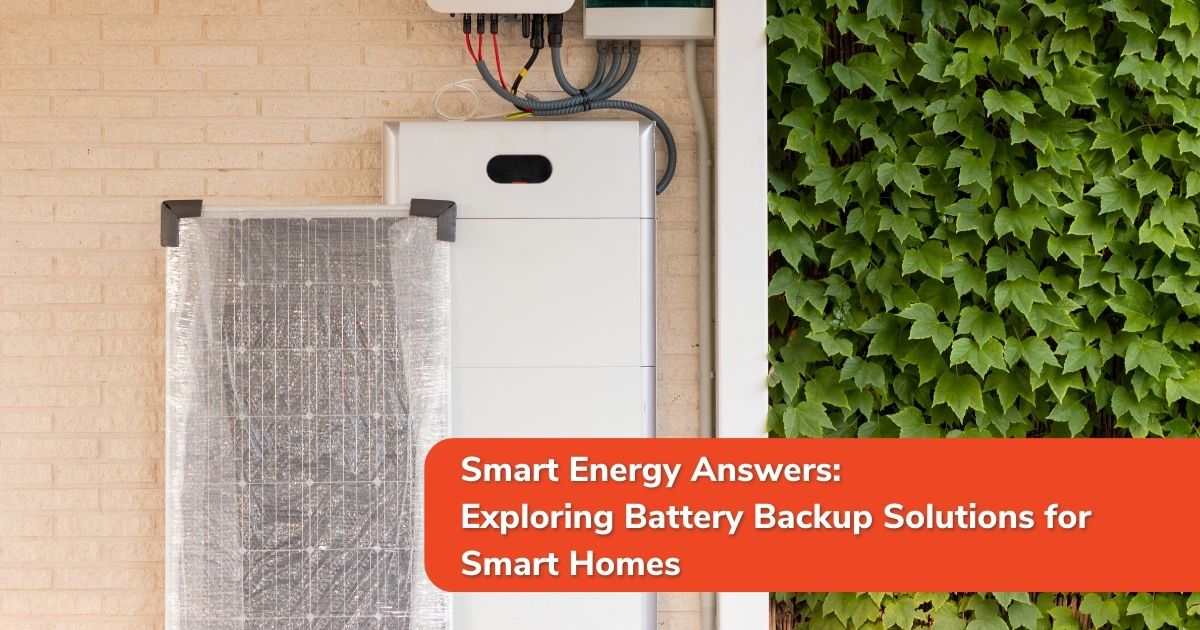Exploring Battery Backup Solutions for Smart Homes

Discover the latest trends and innovations in battery backup solutions for smart homes.
Growing importance of energy storage in smart home systems
Energy storage is becoming increasingly important in smart home systems. With the rise of renewable energy sources like solar power, there is a need to store excess energy for later use. Battery backup solutions provide a reliable and efficient way to store this energy, ensuring that homeowners have a constant and uninterrupted power supply.
In addition to storing energy, battery backup solutions also help in managing electricity usage. They can be used to shift energy consumption to off-peak hours, when electricity rates are lower. This not only helps homeowners save money on their energy bills but also reduces the strain on the grid during peak hours.
Furthermore, battery backup solutions contribute to a more sustainable and resilient energy infrastructure. By storing excess energy during times of low demand, they help reduce the need for additional power generation during peak hours. This, in turn, reduces the reliance on fossil fuel power plants and decreases greenhouse gas emissions.
Overall, the growing importance of energy storage in smart home systems highlights the need for efficient and sustainable battery backup solutions. These solutions not only provide reliable backup power during grid outages but also contribute to a more efficient and sustainable energy future.
Explanation of how solar energy storage complements photovoltaic systems
Solar energy storage plays a crucial role in complementing photovoltaic (PV) systems. PV systems generate electricity from sunlight using solar panels, but this electricity is only available when the sun is shining. By integrating battery backup solutions with PV systems, homeowners can store excess solar energy during the day and use it at night or during cloudy periods.
This combination of solar energy storage and PV systems provides homeowners with a reliable and uninterrupted power supply. It allows them to become less dependent on the grid and reduce their electricity bills by utilising their stored solar energy. Additionally, it enables homeowners to take advantage of renewable energy sources and reduce their carbon footprint.
Solar energy storage also helps in achieving energy independence. With a properly sized battery storage system, homeowners can rely on their own generated solar energy for their electricity needs, even during grid outages. This provides peace of mind and ensures that critical appliances and devices continue to function during emergencies.
In summary, solar energy storage complements photovoltaic systems by providing a reliable and sustainable energy solution. It allows homeowners to maximise their use of solar energy, reduce their reliance on the grid, and achieve energy independence.
Importance of efficient energy management and integration with smart home systems
Efficient energy management and integration with smart home systems are essential for maximising the benefits of battery backup solutions. Smart home systems enable homeowners to monitor and control their energy usage, optimising the performance of their battery storage systems.
By integrating battery backup solutions with smart home systems, homeowners can automate energy management processes. This includes scheduling charging and discharging cycles based on energy demand and electricity rates. It also allows for the implementation of demand response strategies, where the battery system can respond to signals from the utility company to reduce energy consumption during peak hours.
Furthermore, smart home systems provide real-time monitoring of battery performance, ensuring that the system is operating optimally. Regular inspections and maintenance can be scheduled based on the system's performance data, ensuring its longevity and reliability.
Overall, efficient energy management and integration with smart home systems enhance the performance and benefits of battery backup solutions. They enable homeowners to optimise their energy usage, reduce costs, and contribute to a more sustainable energy future.
Determining the appropriate size and capacity of storage systems for individual homes
Determining the appropriate size and capacity of storage systems for individual homes is crucial for maximising the benefits of battery backup solutions. Each home has unique energy requirements and usage patterns, and the storage system should be sized accordingly.
Factors to consider when determining the size and capacity of storage systems include the home's energy consumption, the number of occupants, and the availability of renewable energy sources such as solar power. It is important to accurately assess the energy needs of the home to ensure that the storage system can meet the demand.
Additionally, the storage system should be scalable to accommodate future energy needs. As the home's energy consumption or renewable energy generation increases, the storage system should be able to expand accordingly. This ensures that the system remains efficient and cost-effective in the long term.
Professional consultation and assessment can help homeowners determine the appropriate size and capacity of storage systems for their individual homes. By investing in the right-sized storage system, homeowners can maximise the benefits of battery backup solutions and optimise their energy usage.
Implementing demand response strategies to maximise energy efficiency
Implementing demand response strategies is crucial for maximising energy efficiency with battery backup solutions. Demand response refers to the ability of the battery system to adjust its energy usage based on signals from the utility company.
By participating in demand response programs, homeowners can contribute to a more efficient and stable energy grid. During times of high demand, the utility company can send signals to the battery system, requesting a reduction in energy consumption. This helps alleviate strain on the grid and reduces the need for additional power generation.
Implementing demand response strategies also benefits homeowners by reducing their energy costs. By shifting energy consumption to off-peak hours, homeowners can take advantage of lower electricity rates. This helps in optimising the use of stored energy and maximising cost savings.
To implement demand response strategies, homeowners need to ensure that their battery backup system is compatible with the utility company's signals and requirements. This may involve installing additional equipment or software to enable communication between the battery system and the utility company.
In conclusion, implementing demand response strategies is crucial for maximising energy efficiency with battery backup solutions. It benefits both homeowners and the energy grid by reducing energy consumption during peak hours and optimising the use of stored energy.
Monitoring and maintaining optimal battery performance through regular inspections
Monitoring and maintaining optimal battery performance is essential for the longevity and reliability of the battery backup system. Regular inspections and maintenance ensure that the system operates at its peak performance and avoids any potential issues.
During inspections, various aspects of the battery system should be checked, including the battery capacity, charging and discharging cycles, voltage levels, and overall system efficiency. Any abnormalities or degradation should be identified and addressed promptly to prevent any further damage or performance degradation.
Additionally, regular inspections provide an opportunity to optimise the battery system's performance. This can involve adjusting charging and discharging settings, updating software, or implementing any necessary repairs or replacements.
Homeowners can either perform these inspections themselves or hire professional technicians to ensure proper maintenance. It is important to follow the manufacturer's guidelines and recommendations for maintenance to ensure the warranty remains valid and the system operates optimally.
By regularly monitoring and maintaining the battery backup system, homeowners can ensure its optimal performance, reliability, and longevity. This provides peace of mind and helps maximise the benefits of battery backup solutions.
Utilising solar energy storage for peak shaving and load shifting
Utilising solar energy storage for peak shaving and load shifting is a key benefit of battery backup solutions. Peak shaving refers to the practice of reducing electricity usage during peak demand periods, while load shifting involves shifting energy consumption to off-peak hours.
By storing excess solar energy during periods of low demand, homeowners can use this stored energy during peak hours instead of relying on the grid. This helps reduce the strain on the grid and ensures a stable and reliable power supply for critical appliances and devices.
Load shifting allows homeowners to take advantage of lower electricity rates during off-peak hours. By scheduling the battery system to discharge during these periods, homeowners can maximise their cost savings and reduce their overall energy consumption.
Additionally, utilising solar energy storage for peak shaving and load shifting helps in achieving a more sustainable energy future. By reducing energy consumption during peak hours, the need for additional power generation from fossil fuel sources is minimised. This helps in reducing greenhouse gas emissions and reliance on non-renewable energy sources.
In summary, battery backup solutions enable homeowners to utilise solar energy storage for peak shaving and load shifting. This helps reduce electricity costs, ensure a stable power supply, and contribute to a more sustainable energy future.
Ensuring reliable backup power during grid outages with solar storage systems
Ensuring reliable backup power during grid outages is a crucial benefit of solar storage systems. When the grid goes down, homeowners with solar storage systems can still have access to electricity, providing comfort and security during emergencies.
During normal operation, solar storage systems store excess solar energy that is generated but not used by the home. This stored energy can be used to power critical appliances and devices during grid outages, ensuring that homeowners have access to essential services.
Solar storage systems with backup power capability can automatically switch to battery power when the grid goes down, providing a seamless transition. This eliminates the need for manual intervention and ensures uninterrupted power supply.
Additionally, solar storage systems with backup power capability can also provide power during periods of low solar generation, such as during extended cloudy periods. This ensures a reliable power supply even when solar energy generation is limited.
In conclusion, solar storage systems with backup power capability provide homeowners with reliable backup power during grid outages. This enhances safety and security during emergencies and ensures uninterrupted access to essential services.
Adhering to safety standards and regulations for battery storage installations
Adhering to safety standards and regulations is essential when installing battery storage systems. Battery systems contain potentially hazardous materials and require proper installation and maintenance to ensure safe operation.
Homeowners should consult local building codes and regulations before installing a battery storage system. These regulations may include specific requirements for system capacity, location, ventilation, and fire safety measures.
It is also important to work with qualified professionals who are knowledgeable about battery storage system installations. They can ensure that the system is installed correctly and safely, following all applicable safety standards and regulations.
Regular maintenance and inspections are also important for ensuring the ongoing safety of the battery storage system. This includes checking for any signs of damage, monitoring temperature levels, and ensuring proper ventilation and airflow.
By adhering to safety standards and regulations, homeowners can ensure the safe and reliable operation of their battery storage system. This provides peace of mind and helps prevent any potential safety hazards.
Encouragement for homeowners to adopt efficient and sustainable energy storage solutions
Encouraging homeowners to adopt efficient and sustainable energy storage solutions is crucial for a more sustainable energy future. Battery backup solutions provide numerous benefits, both for homeowners and the environment.
By adopting battery backup solutions, homeowners can reduce their reliance on the grid, optimise their energy usage, and save money on their electricity bills. They can also contribute to a more stable energy grid by participating in demand response programs and reducing energy consumption during peak hours.
From an environmental perspective, battery backup solutions help in integrating renewable energy sources into the grid. By storing excess solar energy, homeowners can reduce the need for additional power generation from fossil fuel sources. This helps in reducing greenhouse gas emissions and combating climate change.
Government incentives and programs can play a crucial role in encouraging homeowners to adopt efficient and sustainable energy storage solutions. These can include financial incentives, rebates, and educational campaigns to raise awareness about the benefits of battery backup solutions.
In conclusion, encouraging homeowners to adopt efficient and sustainable energy storage solutions is vital for a more sustainable energy future. By maximising the use of renewable energy sources and reducing reliance on the grid, homeowners can contribute to a cleaner and more resilient energy infrastructure.
%20(1).png?width=265&height=96&name=www.smartenergyanswers.com.auhs-fshubfsSmart%20Energy%20Answers%20Logo%20(HIRES)%20(1).png)

.png?width=514&height=121&name=Tesla%20Powerwall%203%20(new).png)







